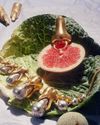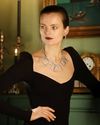
At Chanel’s watch factory in La Chaux-de-Fonds, Switzerland, groups of artisans hunch over miniscule watch parts so tiny they can only be held using a tweezer, in order to deftly assemble the classic J12 watch by hand. Each watch typically takes two months to construct, from the ceramic band to the steel-edged case to the self-winding mechanism. The French luxury brand spends approximately 5,259,492 important seconds to achieve perfection for every piece.
The painstaking and stringent process includes slicing and baking the ceramic, assembling the links, screwing down the hours and second hands individually and polishing the case — a procedure that runs like clockwork and took Arnaud Chastaingt four years to put together, after joining the brand as the director of the Chanel Watch Creation Studio in 2013.
When this iconic watch launched as a reprisal version of the original J12 (introduced in 2000) last year, it re-emphasised everything that had been novel about the design. Chastaingt upended every conceivable detail of the watch: He shaved down its bezel and increased the number of notches around its ring, shrunk its crown by a third of its original size and redesigned the numeral indexes in its signature ceramic material. At the heart of the rejuvenation was the 12.1 calibre automatic movement, developed by Kenissi. The watch is thoroughly enhanced in a way that is undetectable to the untrained eye but is instantly felt by the wearer.
Bu hikaye T Singapore: The New York Times Style Magazine dergisinin September 2020 sayısından alınmıştır.
Start your 7-day Magzter GOLD free trial to access thousands of curated premium stories, and 9,000+ magazines and newspapers.
Already a subscriber ? Giriş Yap
Bu hikaye T Singapore: The New York Times Style Magazine dergisinin September 2020 sayısından alınmıştır.
Start your 7-day Magzter GOLD free trial to access thousands of curated premium stories, and 9,000+ magazines and newspapers.
Already a subscriber? Giriş Yap

Look At Us
As public memorials face a public reckoning, there’s still too little thought paid to how women are represented — as bodies and as selves.

Two New Jewellery Collections Find Their Inspiration In The Human Anatomy
Two new jewellery collections find their inspiration in the human anatomy.

She For She
We speak to three women in Singapore who are trying to improve the lives of women — and all other gender identities — through their work.
Over The Rainbow
How the bright colours and lively prints created by illustrator Donald Robertson brought the latest Weekend Max Mara Flutterflies capsule collection to life.

What Is Love?
The artist Hank Willis Thomas discusses his partnership with the Japanese fashion label Sacai and the idea of fashion in the context of the art world.

The Luxury Hotel For New Mums
Singapore’s first luxury confinement facility, Kai Suites, aims to provide much more than plush beds and 24-hour infant care: It wants to help mothers with their mental and emotional wellbeing as well.

Who Gets To Eat?
As recent food movements have focused on buying local or organic, a deeper and different conversation is happening among America’s food activists: one that demands not just better meals for everyone but a dismantling of the structures that have failed to nourish us all along.

Reimagining The Future Of Fashion
What do women want from their clothes and accessories, and does luxury still have a place in this post-pandemic era? The iconic designer Alber Elbaz thinks he has the answers with his new label, AZ Factory.

A Holiday At Home
Once seen as the less exciting alternative to an exotic destination holiday, the staycation takes on new importance.
All Dressed Up, Nowhere To Go
Chinese supermodel He Sui talks about the unseen pressures of being an international star, being a trailblazer for East Asian models in the fashion world, and why, at the end of the day, she is content with being known as just a regular girl from Wenzhou.